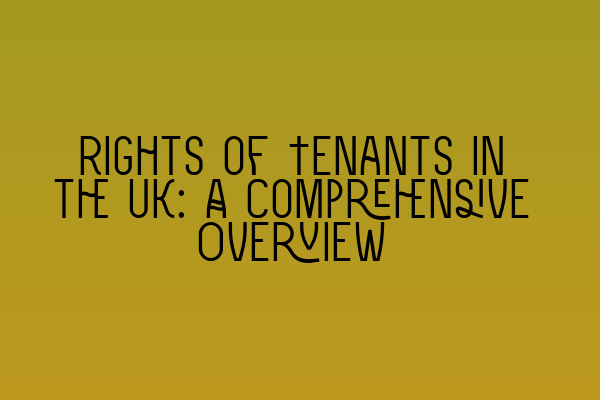Rights of Tenants in the UK: A Comprehensive Overview
As a tenant in the UK, it is important to understand your rights and responsibilities. The relationship between landlords and tenants is governed by a set of laws and regulations to ensure fair treatment and protection for both parties. In this comprehensive overview, we will discuss the rights that tenants have in the UK, their entitlements, and what they can do in case of any disputes or issues.
1. Right to a Written Tenancy Agreement
When a tenancy agreement is in place, it should be provided in writing and include details such as the length of the tenancy, the rental price, and any other important terms and conditions. This document is crucial as it outlines the rights and responsibilities of both the tenant and the landlord. It is highly recommended to thoroughly read and understand the agreement before signing it.
2. Right to Live in a Safe and Healthy Environment
As a tenant, you have the right to live in a safe and habitable property. The landlord is responsible for ensuring that the property meets certain health and safety standards. This includes maintaining the structure of the building, providing adequate heating and ventilation, and ensuring the property is free from any hazards.
3. Right to Privacy
Tenants have the right to enjoy their privacy and peaceful occupation of the property. Landlords should provide reasonable notice before entering the property, except in cases of emergencies. Tenants should also have the right to refuse entry if they do not feel comfortable, unless it is necessary for maintenance or repairs.
4. Right to Protection from Unfair Eviction
Under the law, landlords must follow a specific eviction process if they wish to end a tenancy. Tenants have the right to be given proper notice and to challenge any eviction in court if they believe it is unjust. Evictions should not be retaliatory or discriminatory, and tenants should not face harassment or forced evictions at any time.
5. Right to a Deposit Protection Scheme
When tenants provide a security deposit, landlords are required to protect it in a government-approved deposit protection scheme. This ensures that the deposit is kept safe and can be returned at the end of the tenancy, minus any deductions for damages or unpaid rent. Landlords must provide tenants with details of the scheme within 30 days of receiving the deposit.
6. Right to a Repairs and Maintenance
Landlords have a legal obligation to maintain the property in a good state of repair. This includes fixing any structural issues, maintaining utilities, and ensuring that essential facilities like heating and plumbing are in working order. If tenants have any repair requests or issues, they should notify the landlord in writing and allow a reasonable amount of time for the repairs to be carried out.
7. Right to Challenge Rent Increases
While landlords have the right to increase rent, they must follow the proper procedures and give reasonable notice. Tenants have the right to challenge any rent increases that they believe are excessive or unfair. If you believe that your rent increase is unreasonable, you can seek advice from organizations such as Citizens Advice or a solicitor specializing in property law.
8. Right to Rightful Deductions from the Deposit
When a tenancy comes to an end, landlords are entitled to deduct reasonable amounts from the deposit for any damages beyond normal wear and tear or unpaid rent. However, tenants have the right to dispute these deductions if they believe they are unfair. It is important to document the condition of the property at the beginning and end of the tenancy to assist in resolving any disputes.
9. Right to Redress and Complaints Procedure
If tenants have any issues or complaints, they should communicate them to their landlord in writing in the first instance. If the landlord does not address the concerns satisfactorily, tenants can seek assistance from organizations such as local council housing departments, housing charities, or the Property Ombudsman. In some cases, legal advice may be necessary, and it is advisable to seek the help of a solicitor specializing in property law.
In conclusion, understanding your rights as a tenant is essential for a smooth and fair tenancy. By knowing what you are entitled to, you can ensure that your rights are protected and that you have a positive renting experience. If you have any further questions or concerns about your rights as a tenant, it is always advisable to seek legal advice from a professional, such as a solicitor specializing in property law.
For further information on related topics, you may find the following articles helpful:
– Understanding Contractual Capacity: Rights and Limitations
– Interactive SQE Mock Tests for Contract Law: Test Your Knowledge
– Join Our SQE Contract Law Webinars: Expert Insights and Guidance
– Contract Law Reforms: An Analysis of Recent Changes
– Parties in a Contract: Rights and Responsibilities
